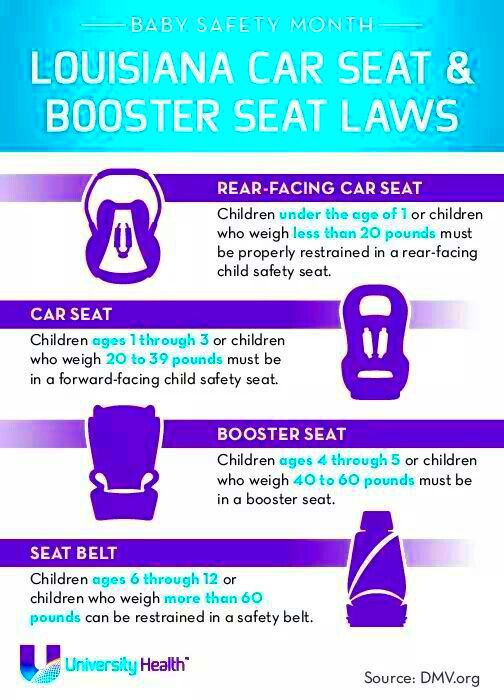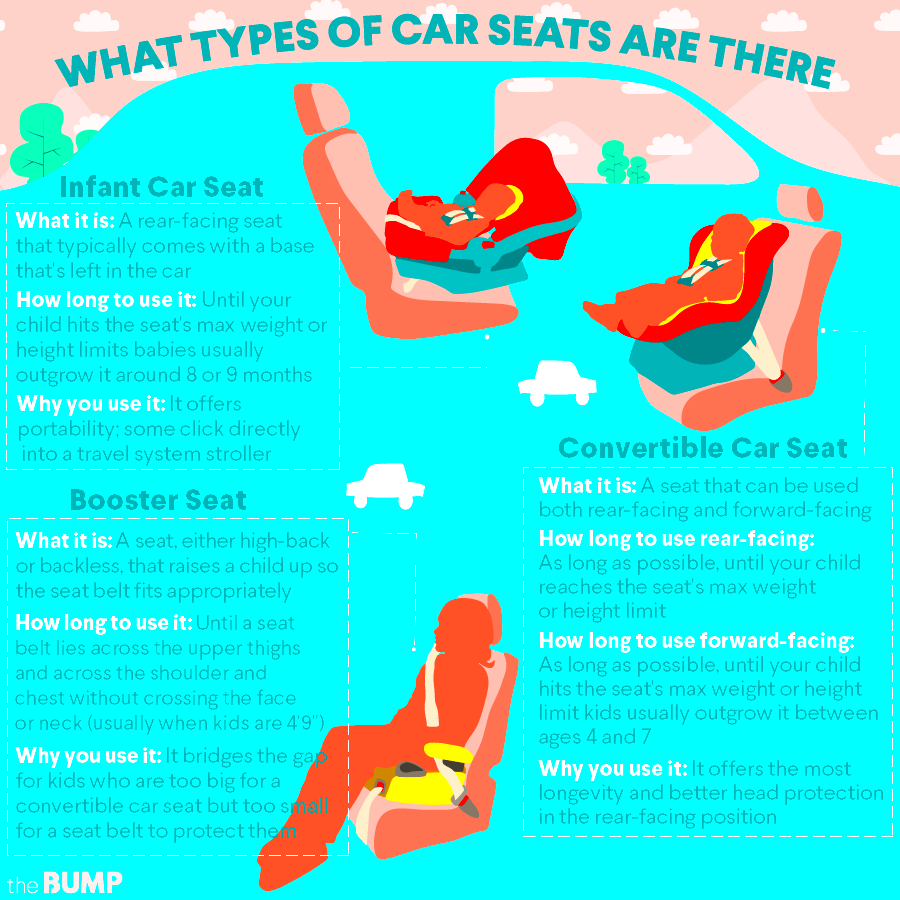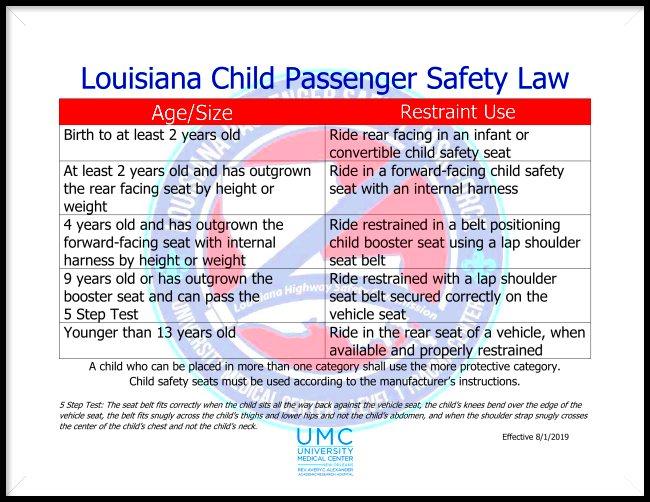Louisiana Car Seat Laws in 2024 and How They Affect Your Family
In Louisiana, car seat laws are designed to keep children safe while traveling. These laws provide guidelines that parents and caregivers must follow to ensure their little ones are protected in vehicles. Understanding these laws is crucial, as they can change frequently, and staying informed helps ensure compliance and safety. This blog post will explore the specifics of Louisiana car seat laws in 2024 and how they impact families across the state.
Importance of Car Seat Safety for Children

Car seat safety is vital for protecting children in case of an accident. According to the National Highway Traffic Safety Administration, car crashes are a leading cause of injury and death for young children. Here’s why proper car seat use is important:
- Reduces Risk of Injury: Properly secured children are less likely to suffer severe injuries during accidents.
- Legal Compliance: Following state laws helps avoid fines and legal issues.
- Peace of Mind: Knowing your child is safe allows for a more relaxed travel experience.
- Establishing Safe Habits: Teaching children about car safety from a young age fosters lifelong safe practices.
Overview of Car Seat Requirements in Louisiana

Louisiana’s car seat laws specify the requirements for different types of car seats based on a child’s age and size. Here’s a quick breakdown:
| Age/Weight | Required Car Seat Type | Notes |
|---|---|---|
| Infants (0-1 year) | Rear-Facing Car Seat | Must remain rear-facing until at least age 2 or until they exceed weight limits. |
| Toddlers (1-4 years) | Forward-Facing Car Seat | Use a 5-point harness for maximum protection. |
| Children (4-8 years) | Booster Seat | Must use until the seat belt fits properly. |
| Over 8 years | Seat Belt | Must be able to sit comfortably with a seat belt. |
These requirements ensure that children are appropriately restrained as they grow, significantly reducing the risk of injury in accidents. Understanding and adhering to these laws is crucial for every family’s safety.
Types of Car Seats and Their Usage

Understanding the different types of car seats is essential for keeping your child safe while traveling. Each type of car seat is designed for specific age groups and stages of development. Here’s a breakdown of the most common car seat types:
- Rear-Facing Car Seats: These seats are designed for infants and toddlers. They provide the best protection for the head, neck, and spine during a crash. It’s recommended to keep your child rear-facing until they are at least 2 years old or until they exceed the weight limit of the seat.
- Forward-Facing Car Seats: Once your child outgrows their rear-facing seat, it’s time to transition to a forward-facing car seat. These seats come with a harness system to secure your child safely. Make sure to use the harness until your child reaches the maximum height or weight limit.
- Booster Seats: After your child has outgrown the forward-facing car seat, they should use a booster seat. This seat elevates your child so that the vehicle’s seat belt fits properly across their chest and lap. Booster seats are usually used until children are about 8 years old or until they reach the height of 4 feet 9 inches.
- Seat Belts: Once your child no longer needs a booster seat, they can transition to using the vehicle’s seat belt. Ensure that the seat belt fits correctly across their shoulder and lap for maximum protection.
Age and Weight Guidelines for Car Seats

Knowing the age and weight guidelines for car seats helps ensure your child is secured appropriately. Each car seat type has specific recommendations:
| Age Group | Weight Range | Recommended Car Seat Type |
|---|---|---|
| Newborn to 1 Year | Up to 35 lbs | Rear-Facing Car Seat |
| 1 to 4 Years | 20-65 lbs | Forward-Facing Car Seat |
| 4 to 8 Years | 40-100 lbs | Booster Seat |
| 8 Years and Older | Over 80 lbs | Seat Belt |
It’s essential to follow these guidelines to keep your child safe. Always refer to your specific car seat manual for detailed weight and height limits. Keeping track of your child’s growth will help you make timely transitions to the next car seat stage.
Exceptions and Special Circumstances in Car Seat Laws
While car seat laws are generally straightforward, there are some exceptions and special circumstances to be aware of:
- Medical Exemptions: In some cases, a child may have medical conditions that prevent them from using standard car seats. In these situations, a physician’s note may be required to use alternative restraints.
- Traveling in Taxis or Rideshares: While it is recommended to use a car seat in any vehicle, some jurisdictions allow exceptions for taxis or rideshare services. However, it’s best to use a car seat whenever possible.
- Vehicles Without Back Seats: If your vehicle does not have a back seat, Louisiana law allows you to place the car seat in the front passenger seat. Be sure to move the seat back as far as possible and deactivate the airbag if the car seat is rear-facing.
- Transportation of Multiple Children: If you have more children than available car seats, some laws allow a child under a certain age to share a seat with an older sibling. However, this should be done with extreme caution, and proper restraints must still be used.
Understanding these exceptions can help you navigate unique situations while keeping your child safe on the road.
Penalties for Non-Compliance with Car Seat Laws
Ignoring Louisiana’s car seat laws can lead to serious consequences. Not only does non-compliance put your child at risk, but it can also result in legal penalties that impact your family. Here’s what you need to know:
- Fines: Failing to secure your child in an appropriate car seat can lead to fines. In Louisiana, these fines can range from $100 to $500, depending on the severity of the violation.
- Points on Driving Record: In addition to fines, drivers may receive points on their driving record. Accumulating too many points can lead to increased insurance premiums or even the suspension of your driver’s license.
- Legal Liability: If you are involved in an accident and your child is not properly restrained, you could face legal repercussions. This can include liability for injuries sustained by your child or others involved in the accident.
- Increased Insurance Rates: Getting cited for violating car seat laws may lead to higher car insurance rates, which can add financial stress to your family.
Understanding these penalties can motivate you to follow the car seat laws diligently. Remember, these laws are in place to protect your loved ones, and adhering to them can save you from headaches down the line.
Tips for Choosing the Right Car Seat for Your Child
Choosing the right car seat can be overwhelming, especially with so many options available. Here are some practical tips to help you select the safest option for your child:
- Check the Weight and Height Limits: Always refer to the car seat’s manual for specific weight and height limits. Ensure the seat you choose is appropriate for your child’s current size and allows for future growth.
- Look for Safety Features: Opt for car seats that have been tested for safety and meet federal standards. Look for features like a 5-point harness, side-impact protection, and energy-absorbing foam.
- Consider Ease of Installation: A car seat that is easy to install correctly is essential. Look for seats with clear instructions, easy-to-use LATCH systems, or built-in indicators that show when the seat is correctly installed.
- Read Reviews: Look up reviews and ratings from other parents. They can provide valuable insights into the ease of use, comfort, and safety of the car seats you’re considering.
- Check for Recalls: Always check if the car seat has been recalled. This information is typically available on the manufacturer’s website or through the National Highway Traffic Safety Administration.
Taking the time to research and choose the right car seat will give you peace of mind knowing your child is secure during every car ride.
Conclusion on Louisiana Car Seat Laws and Family Safety
In summary, Louisiana car seat laws play a crucial role in keeping children safe while traveling. Understanding these laws, the types of car seats available, and the importance of compliance can significantly reduce the risk of injury in the event of an accident. Remember, the right car seat protects your child and fosters safe habits for the future.
As parents and caregivers, it’s our responsibility to stay informed and make choices that prioritize our children’s safety. By following the guidelines and utilizing appropriate car seats, we can create a safer environment for our families on the road. Let’s commit to being proactive and diligent in ensuring our children are properly restrained every time we travel.
FAQs about Louisiana Car Seat Laws
Understanding Louisiana car seat laws can be challenging, especially with the various requirements and recommendations. Here are some frequently asked questions to help clarify common concerns:
What are the age requirements for car seats in Louisiana?
In Louisiana, the law requires children to be in a rear-facing car seat until they are at least 2 years old or until they exceed the height and weight limits set by the car seat manufacturer. After that, children can transition to a forward-facing car seat until they reach the maximum weight or height limit for that seat.
When can my child stop using a booster seat?
Children should use a booster seat until they are at least 8 years old or until they reach a height of 4 feet 9 inches. It is essential to ensure that the seat belt fits properly across their shoulder and lap when transitioning to using just the seat belt.
Are there any exceptions to the car seat laws?
Yes, there are exceptions in special circumstances, such as when transporting children in taxis or rideshare vehicles. However, it’s always safer to use a car seat when possible. Additionally, some medical exemptions allow children with certain conditions to use alternative restraints, but a physician’s note is usually required.
What are the penalties for not following car seat laws?
Failing to comply with Louisiana car seat laws can result in fines ranging from $100 to $500. You may also receive points on your driving record, leading to increased insurance premiums or even license suspension.
How can I ensure my car seat is installed correctly?
To ensure proper installation, read the car seat manual and your vehicle’s owner manual. Many local fire stations and hospitals offer car seat checks. Additionally, consider using car seats with LATCH systems for easier installation, and always make sure the car seat is secure and does not move more than an inch when pulled at the base.
By understanding these frequently asked questions, you can better navigate Louisiana’s car seat laws, ensuring your child’s safety while on the road.


